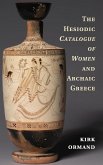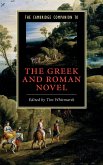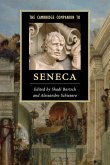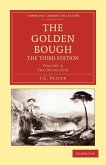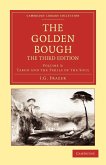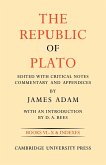The Romance between Greece and the East
Herausgeber: Whitmarsh, Tim; Thomson, Stuart
The Romance between Greece and the East
Herausgeber: Whitmarsh, Tim; Thomson, Stuart
- Gebundenes Buch
- Merkliste
- Auf die Merkliste
- Bewerten Bewerten
- Teilen
- Produkt teilen
- Produkterinnerung
- Produkterinnerung
Twenty essays by renowned scholars explore contact between Greece and the Ancient Near East through the medium of prose fiction.
Andere Kunden interessierten sich auch für
![The Romance between Greece and the East The Romance between Greece and the East]() The Romance between Greece and the East54,99 €
The Romance between Greece and the East54,99 €![The Hesiodic Catalogue of Women and Archaic Greece The Hesiodic Catalogue of Women and Archaic Greece]() Kirk OrmandThe Hesiodic Catalogue of Women and Archaic Greece118,99 €
Kirk OrmandThe Hesiodic Catalogue of Women and Archaic Greece118,99 €![The Cambridge Companion to the Greek and Roman Novel The Cambridge Companion to the Greek and Roman Novel]() Tim Whitmarsh (ed.)The Cambridge Companion to the Greek and Roman Novel129,99 €
Tim Whitmarsh (ed.)The Cambridge Companion to the Greek and Roman Novel129,99 €![The Cambridge Companion to Seneca The Cambridge Companion to Seneca]() The Cambridge Companion to Seneca40,99 €
The Cambridge Companion to Seneca40,99 €![The Golden Bough The Golden Bough]() James George FrazerThe Golden Bough41,99 €
James George FrazerThe Golden Bough41,99 €![The Golden Bough - Volume 3 The Golden Bough - Volume 3]() James George FrazerThe Golden Bough - Volume 350,99 €
James George FrazerThe Golden Bough - Volume 350,99 €![The Republic of Plato The Republic of Plato]() The Republic of Plato66,99 €
The Republic of Plato66,99 €-
-
-
Twenty essays by renowned scholars explore contact between Greece and the Ancient Near East through the medium of prose fiction.
Hinweis: Dieser Artikel kann nur an eine deutsche Lieferadresse ausgeliefert werden.
Hinweis: Dieser Artikel kann nur an eine deutsche Lieferadresse ausgeliefert werden.
Produktdetails
- Produktdetails
- Verlag: Cambridge University Press
- Seitenzahl: 412
- Erscheinungstermin: 14. November 2013
- Englisch
- Abmessung: 235mm x 157mm x 27mm
- Gewicht: 745g
- ISBN-13: 9781107038240
- ISBN-10: 1107038243
- Artikelnr.: 37800806
- Herstellerkennzeichnung
- Libri GmbH
- Europaallee 1
- 36244 Bad Hersfeld
- gpsr@libri.de
- Verlag: Cambridge University Press
- Seitenzahl: 412
- Erscheinungstermin: 14. November 2013
- Englisch
- Abmessung: 235mm x 157mm x 27mm
- Gewicht: 745g
- ISBN-13: 9781107038240
- ISBN-10: 1107038243
- Artikelnr.: 37800806
- Herstellerkennzeichnung
- Libri GmbH
- Europaallee 1
- 36244 Bad Hersfeld
- gpsr@libri.de
1. The romance between Greece and the East Tim Whitmarsh; Part I.
Egyptians: 2. Greek fiction and Egyptian fiction: are they related, and, if
so, how? Ian Rutherford; 3. Manetho John Dillery; 4. Imitatio Alexandri in
Egyptian literary tradition Kim Ryholt; 5. Divine anger management: the
Greek version of the myth of the sun's eye (P.Lond.Lit. 192) Stephanie
West; 6. Fictions of cultural authority Susan Stephens; Part II.
Mesopotamians and Iranians: 7. Berossus Johannes Haubold; 8. The Greek
novel Ninus and Semiramis: its background in Assyrian and Seleucid history
and monuments Stephanie Dalley; 9. Ctesias, the Achaemenid court, and the
history of the Greek novel Josef Wiesehöfer; 10. Iskander and the idea of
Iran Daniel Selden; Part III. Jews and Phoenicians: 11. Josephus' Esther
and Diaspora Judaism Emily Kneebone; 12. The eastern king in the Hebrew
Bible: novelistic motifs in early Jewish literature Jennie Barbour; 13.
'Lost in translation'? The Phoenician Journal of Dictys of Crete Karen Ní
Mheallaigh; 14. Milesiae Punicae: how Punic was Apuleius? Stephen Harrison;
Part IV. Anatolians: 15. The victory of Greek Ionia in Xenophon's Ephesiaca
Aldo Tagliabue; 16. Milesian tales Ewen Bowie; Part V. Transmission and
Reception: 17. Does triviality translate? The Life of Aesop travels east
Pavlos Avlamis; 18. Mime and the romance Ruth Webb; 19. Orality, folktales,
and the cross-cultural transmission of narrative Larry Kim; 20. History,
empire and the novel: Pierre-Daniel Huet and the origins of the romance
Phiroze Vasunia.
Egyptians: 2. Greek fiction and Egyptian fiction: are they related, and, if
so, how? Ian Rutherford; 3. Manetho John Dillery; 4. Imitatio Alexandri in
Egyptian literary tradition Kim Ryholt; 5. Divine anger management: the
Greek version of the myth of the sun's eye (P.Lond.Lit. 192) Stephanie
West; 6. Fictions of cultural authority Susan Stephens; Part II.
Mesopotamians and Iranians: 7. Berossus Johannes Haubold; 8. The Greek
novel Ninus and Semiramis: its background in Assyrian and Seleucid history
and monuments Stephanie Dalley; 9. Ctesias, the Achaemenid court, and the
history of the Greek novel Josef Wiesehöfer; 10. Iskander and the idea of
Iran Daniel Selden; Part III. Jews and Phoenicians: 11. Josephus' Esther
and Diaspora Judaism Emily Kneebone; 12. The eastern king in the Hebrew
Bible: novelistic motifs in early Jewish literature Jennie Barbour; 13.
'Lost in translation'? The Phoenician Journal of Dictys of Crete Karen Ní
Mheallaigh; 14. Milesiae Punicae: how Punic was Apuleius? Stephen Harrison;
Part IV. Anatolians: 15. The victory of Greek Ionia in Xenophon's Ephesiaca
Aldo Tagliabue; 16. Milesian tales Ewen Bowie; Part V. Transmission and
Reception: 17. Does triviality translate? The Life of Aesop travels east
Pavlos Avlamis; 18. Mime and the romance Ruth Webb; 19. Orality, folktales,
and the cross-cultural transmission of narrative Larry Kim; 20. History,
empire and the novel: Pierre-Daniel Huet and the origins of the romance
Phiroze Vasunia.
1. The romance between Greece and the East Tim Whitmarsh; Part I.
Egyptians: 2. Greek fiction and Egyptian fiction: are they related, and, if
so, how? Ian Rutherford; 3. Manetho John Dillery; 4. Imitatio Alexandri in
Egyptian literary tradition Kim Ryholt; 5. Divine anger management: the
Greek version of the myth of the sun's eye (P.Lond.Lit. 192) Stephanie
West; 6. Fictions of cultural authority Susan Stephens; Part II.
Mesopotamians and Iranians: 7. Berossus Johannes Haubold; 8. The Greek
novel Ninus and Semiramis: its background in Assyrian and Seleucid history
and monuments Stephanie Dalley; 9. Ctesias, the Achaemenid court, and the
history of the Greek novel Josef Wiesehöfer; 10. Iskander and the idea of
Iran Daniel Selden; Part III. Jews and Phoenicians: 11. Josephus' Esther
and Diaspora Judaism Emily Kneebone; 12. The eastern king in the Hebrew
Bible: novelistic motifs in early Jewish literature Jennie Barbour; 13.
'Lost in translation'? The Phoenician Journal of Dictys of Crete Karen Ní
Mheallaigh; 14. Milesiae Punicae: how Punic was Apuleius? Stephen Harrison;
Part IV. Anatolians: 15. The victory of Greek Ionia in Xenophon's Ephesiaca
Aldo Tagliabue; 16. Milesian tales Ewen Bowie; Part V. Transmission and
Reception: 17. Does triviality translate? The Life of Aesop travels east
Pavlos Avlamis; 18. Mime and the romance Ruth Webb; 19. Orality, folktales,
and the cross-cultural transmission of narrative Larry Kim; 20. History,
empire and the novel: Pierre-Daniel Huet and the origins of the romance
Phiroze Vasunia.
Egyptians: 2. Greek fiction and Egyptian fiction: are they related, and, if
so, how? Ian Rutherford; 3. Manetho John Dillery; 4. Imitatio Alexandri in
Egyptian literary tradition Kim Ryholt; 5. Divine anger management: the
Greek version of the myth of the sun's eye (P.Lond.Lit. 192) Stephanie
West; 6. Fictions of cultural authority Susan Stephens; Part II.
Mesopotamians and Iranians: 7. Berossus Johannes Haubold; 8. The Greek
novel Ninus and Semiramis: its background in Assyrian and Seleucid history
and monuments Stephanie Dalley; 9. Ctesias, the Achaemenid court, and the
history of the Greek novel Josef Wiesehöfer; 10. Iskander and the idea of
Iran Daniel Selden; Part III. Jews and Phoenicians: 11. Josephus' Esther
and Diaspora Judaism Emily Kneebone; 12. The eastern king in the Hebrew
Bible: novelistic motifs in early Jewish literature Jennie Barbour; 13.
'Lost in translation'? The Phoenician Journal of Dictys of Crete Karen Ní
Mheallaigh; 14. Milesiae Punicae: how Punic was Apuleius? Stephen Harrison;
Part IV. Anatolians: 15. The victory of Greek Ionia in Xenophon's Ephesiaca
Aldo Tagliabue; 16. Milesian tales Ewen Bowie; Part V. Transmission and
Reception: 17. Does triviality translate? The Life of Aesop travels east
Pavlos Avlamis; 18. Mime and the romance Ruth Webb; 19. Orality, folktales,
and the cross-cultural transmission of narrative Larry Kim; 20. History,
empire and the novel: Pierre-Daniel Huet and the origins of the romance
Phiroze Vasunia.



